People who got a basic income prioritized time with family, new work opportunities, education, entrepreneurship, and long-term planning. They escaped abusive situations. Read some of their stories below.
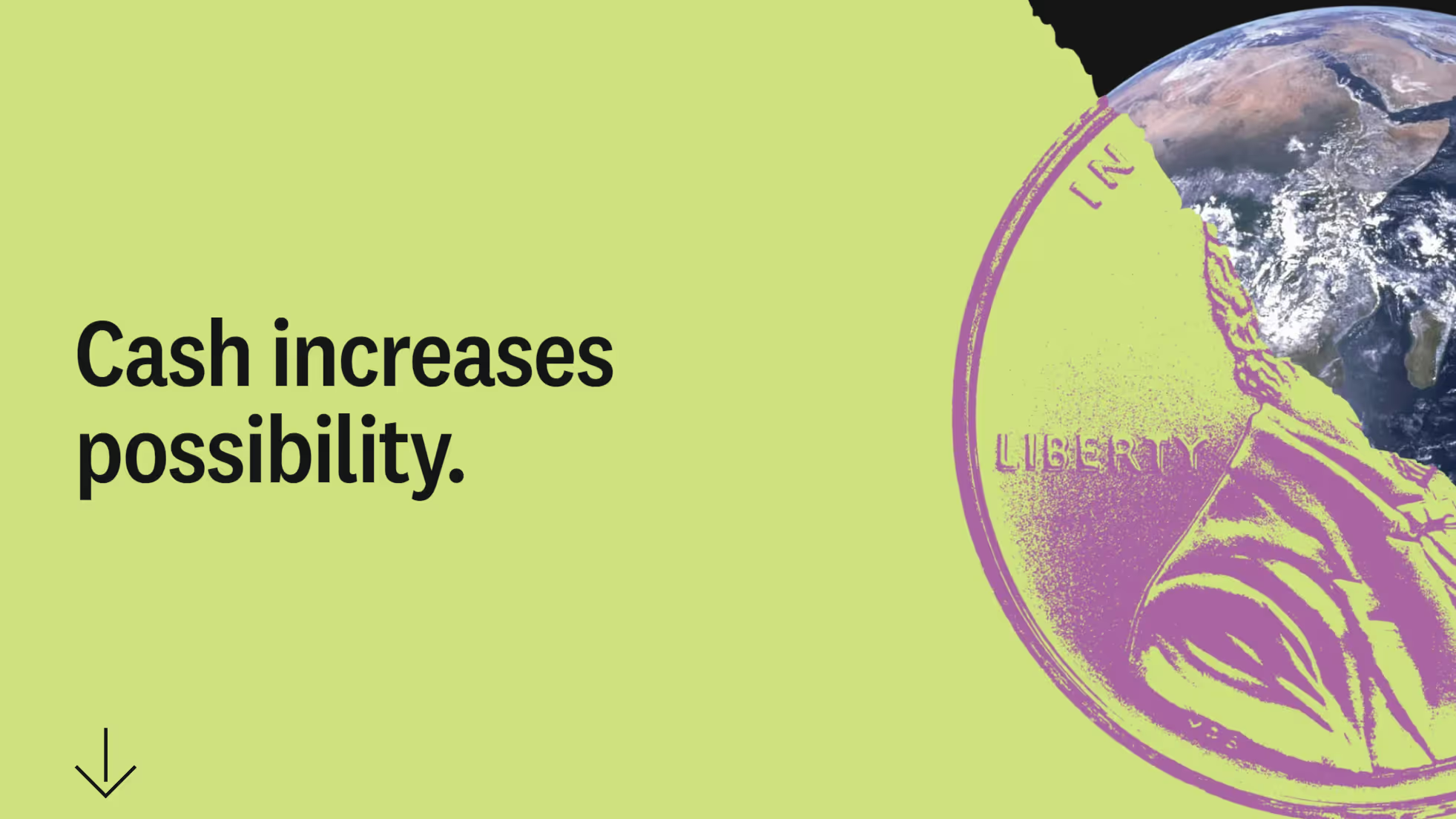
The following stories are taken from the OpenResearch basic income pilot backed by OpenAI CEO Sam Altman, in which 1,000 US recipients got $1,000/month unconditionally for 3 years. These first-hand accounts show us how giving people a guaranteed basic income can help them:
Some recipients used the cash to replace the income lost from quitting their job or reducing work hours, opting to instead be a full time caregiver or spend time with family.
Bethany left her job to homeschool her three children, two of whom had recently been diagnosed with autism and ADHD and were struggling with traditional education.
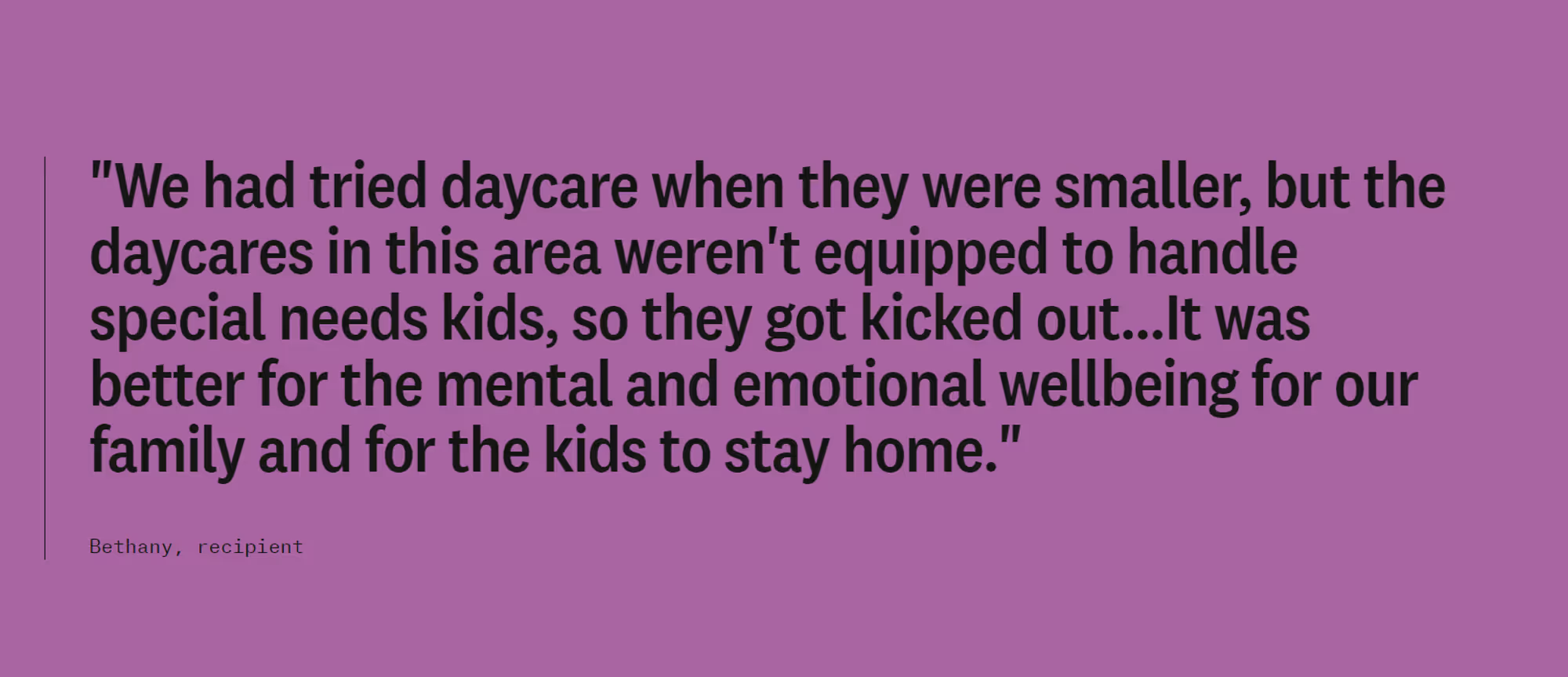
Kyle is a father of three… He had been thinking about getting a second job to pay off the debt but was worried about affording childcare. “I can't afford to pay somebody to watch my kids while I go make 5 or $10 an hour. It just doesn't make sense if I'm paying $40 an hour for childcare.”
The $1,000 a month made it so he didn’t have to work two jobs, and he could spend more time with his children. “Just being able to be more aware and present.” He used the money to break the “vicious cycle” of debt.
Ramona is a mother of four and a new grandmother to a baby girl. For Ramona, the $1,000 came at the perfect time. Her hours had just been cut at work and though she was able to make ends meet, she was having to dip into her savings. “I'm very thankful because the program came in handy when I needed it most. Like it was a blessing.” The money kept her from having to take on a second job so she’s able to spend more time with her kids, helping her daughter with homework, and having “a mommy and daughter day” on the weekends. Without the money she tells us, “I would've been at work probably more than what I normally would have been. Working two jobs and stuff, trying to balance it out and not enough time spending it with my loved ones.”
Some recipients used the cash transfer not to step away from work, but to pursue employment opportunities that might not have been possible without the financial cushion provided by the transfer.
In Lisa’s case, this meant taking a lower paying job in a different field. She learned about an entry-level position with opportunities for advancement, but the hourly wage fell short of what she required to cover her expenses. She was optimistic about the potential for growth in the role and took the job, planning to supplement her income with cash transfer payments in the meantime. Two years later, her gamble paid off: she was in a salaried position, making close to six figures. At the time of the most recent interview, Lisa had gotten two promotions.
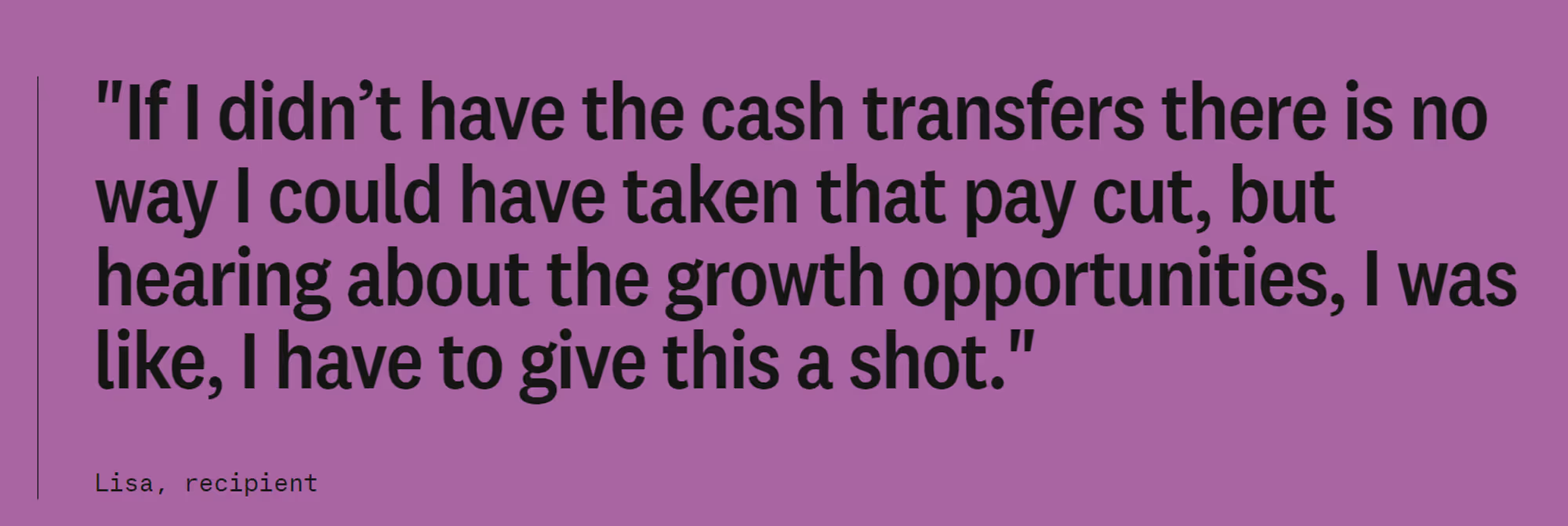
Jessie, a single mother to two children, is a business analyst. During the three years of the program she was laid off from two jobs. The $1,000 a month gave her a financial cushion to be able to search for a new job each time. The first time, Jessie was able to spend months looking for a job until she found one she wanted. Her income from employment increased over the three years in the program. Now, Jessie finds herself unemployed again, but she has money saved up.
Between her savings, unemployment insurance, and the unconditional cash, she is able to weather this period of unemployment.
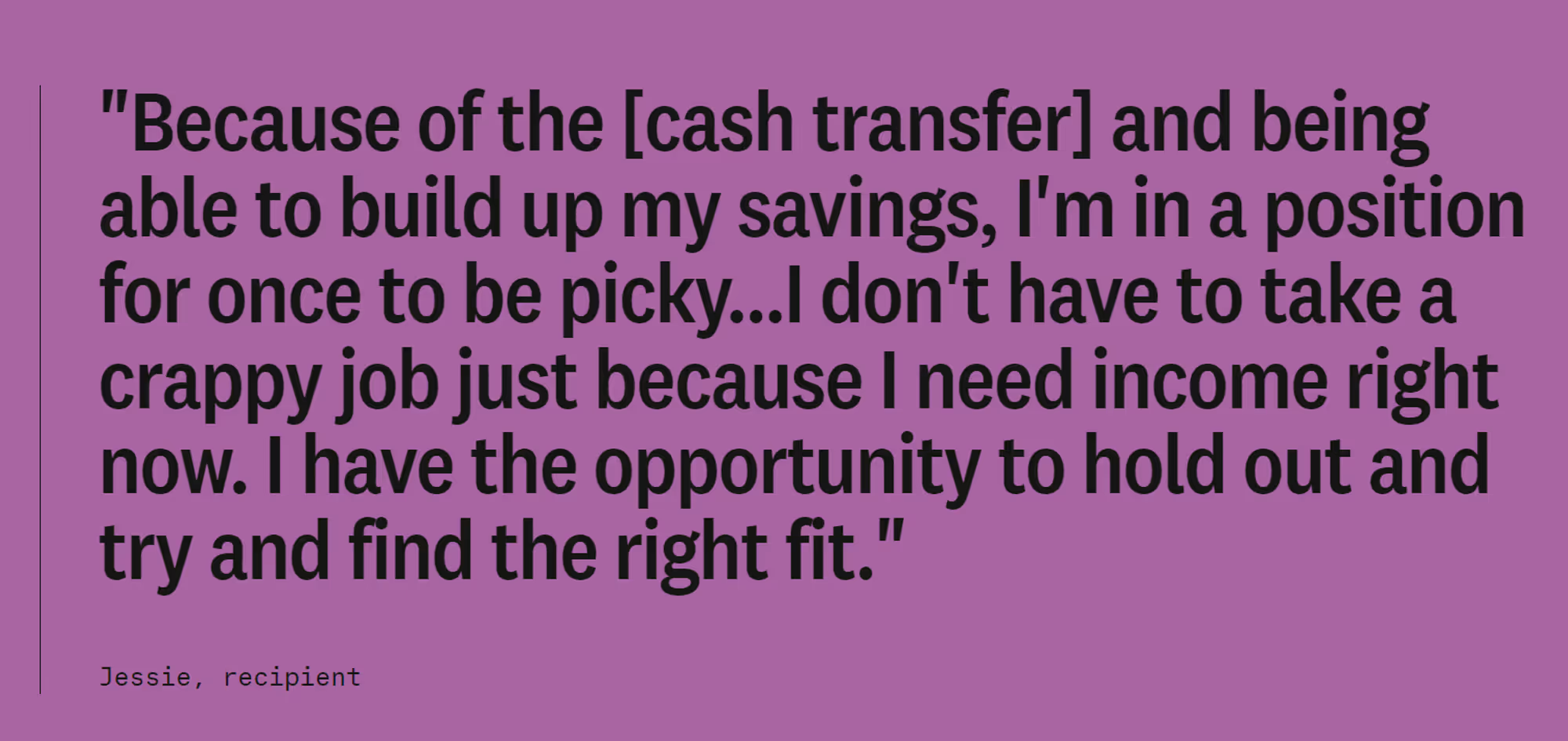
One recipient, Tara, quit working following a car accident when her employer refused to accommodate her follow-up appointments. She used the cash to cover her expenses while she completed a year-long job training program and internship. The training program offered a monthly stipend of $300 to $600—an amount she could never afford to live on prior to the cash transfers.
When Tara first started receiving the $1,000 per month, she is working a series of dead-end jobs. By the end of the program she had started a full-time position with a Fortune 500 multinational company.
Chelsea is a first generation college student. At the start of the program, she had recently been accepted to a graduate program, and her biggest source of stress was trying to figure out what she was going to do for money while she goes to school. Growing up low-income and without family support, she felt at a disadvantage. “I put myself through school, and I’ll have to do that again. I guess not having a family contribution to my education has been the biggest financial hardship.” When she learned about the $1,000, she saw it as evening the playing field, and bringing her up to level with her middle class friends.
“Being told that I was about to get a thousand dollars a month for three years was life-changing…it really felt like I was getting a scholarship to help support me while I was trying to get into grad school. In grad school it provided a cushion where I don't know how I could've done grad school without this money.”
Now, three years later, Chelsea has graduated with a master's degree.
For Anthony, the money unlocked his potential. During the last three years, Anthony uses the $1,000 to save money and eventually rents an apartment for himself, his girlfriend, and their daughter in a neighborhood he prefers. He uses the money to buy a better computer that he needed for his digital art. He also used the money to pay for classes in an advanced technology program. The unconditional income helped him go back to school, and supported him investing more time and effort into his business. As a result, his graphic design business is now a primary source of income.
Eliza is a mother to two children. She lives with her husband, her business partner, and her two young sons. Eliza, her business partner, and her husband all work in the theater. Eliza has a BFA in Fashion Design and her husband works for a theater-related non-profit. Prior to the start of the program, Eliza co-owns a costuming business out of her home, making high-end, made-to-order costumes. The $1,000 per month helped their small business become bigger over the three years in a way that was "overwhelmingly positive." Because of the money, Eliza didn't have to do as many "outside jobs" for steady income and instead could spend her time developing her own ideas and products, progressing their business.
The unconditional cash allowed Eliza more time for creativity. She tells us they have “managed to rise to the top of their field”. Their business now comes highly recommended, and they have to turn away business.
Dominique grew up feeling like she didn’t matter. Raised in an abusive household, she was constantly told she would never amount to anything. As an adult, her inability to support her family financially continued to reinforce those beliefs in her mind. She was struggling to find employment because she could not afford a car, and this caused significant depression. She feels that with a car, and a job, “I might actually be able to get a little bit happier with things. I won't feel like such a burden on people. Not having to ask people to help out financially would help out significantly in my mind.”
With the money, Dominique was able to get a car, and secure a job. She put money down on a house and moved her family.. She also used the money to help people, giving money to her friends and family when they needed it. She feels that being a part of the program has helped undo some of the negative self-talk instilled in her as a child.
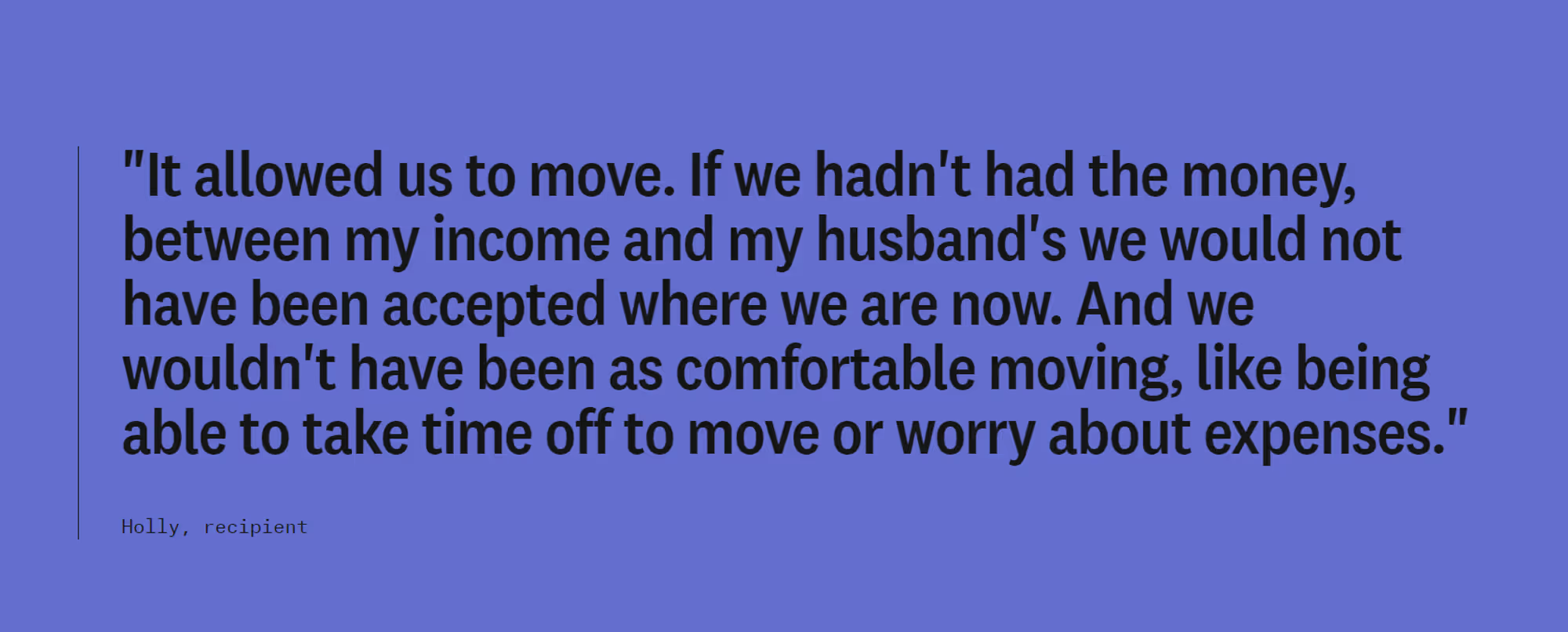
Mallory is a mother to two pre-teen daughters. Prior to being selected to receive $1,000 per month, Mallory tells us, “I was kind of stuck”. Mallory was in an abusive relationship with her husband. He refused to work, and she was the sole income for her household. Because of this, she wasn’t able to save money and didn’t feel she had financial security to make it on her own.
Because of the $1,000 she was able to get her daughters away from an abusive home life
Tessa experienced a brain injury several years before enrolling in the program; it impairs her ability to drive and makes it difficult for her to live independently. She had repeatedly applied for and been denied disability and continued to do so unsuccessfully during the program. At the time of enrollment, she was working 20 hours a week at a warehouse job that was contributing to a decline in her physical health. She quit the job, did not work again during the program, and used the cash transfer to pay all of her expenses, including the cost of a surgery she had been putting off. Tessa viewed the transfers as a replacement for denied disability payments, and she said the program gave her hope and a positive outlook.
Four years before the program started, Lila was the victim of a horrific domestic violence attack. “I got shot three times in my head, stabbed in the neck. I was completely paralyzed on the right side, totally blind. Um, some of it has come back and I've learned to like walk and stuff again, but that has definitely like affected my life so much.” As a result, she has PTSD, partial blindness and multiple complications, impairing her ability to drive, and making it difficult for her to work or live independently. She applied for disability benefits but was repeatedly denied.
When she learns she will be receiving $1,000 a month felt like it was replacing “the disability that the government keeps refusing me.” Unable to work, she feels if it were not for the program, “I probably would be homeless without it.”
One recipient, Jeremiah, told us this was the first time in his life he had money to budget and it changed his outlook on financial planning. “When I first [saw] the thousand come, it changed my whole perspective…I'm gonna take this as a sign that I need to get more, I need to lock in.” Though $1000 per month was not enough to provide Jeremiah with financial stability, he felt it gave him a foundation to learn how to manage money—something he felt would benefit him even after the transfers ended.
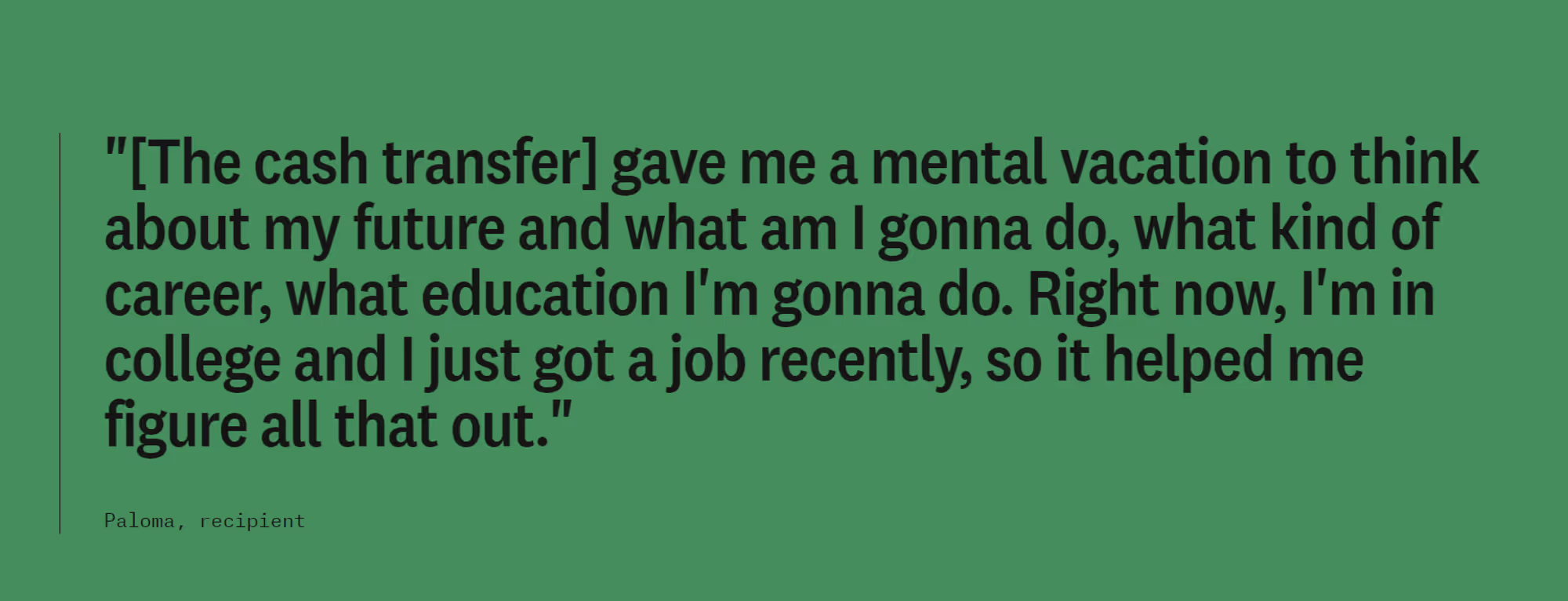
For people who were working long hours in low-income jobs to make ends meet—or had been prior to being laid off due to the pandemic—the transfer made it possible for them to simply take a break. For some recipients, the break was more valuable than the extra dollar.
Shawn, for example, had been working 72 hours a week at the time of enrollment. His goal was to eventually start his own music company, so in the first year of the study he was working long hours producing music while also working for another company. Then one day, Shawn told us, “I felt like I just wanted to take a break, like not do as much work just for myself and my mental.”
The rigorous OpenResearch study confirmed what we already know: Basic income ended poverty. People took risks to find better jobs, train, and escape abusive environments. There was minimal impact on work beyond single parents. To read UBI Works' highlights of the OpenResearch findings, click here: ubiworks.ca/openresearch
